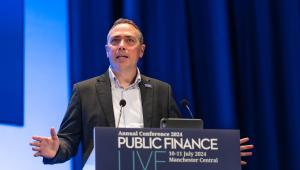The sustainability of the sector for the next five “will depend on the Spending Review [in 2019]”, Melanie Dawes, permanent secretary at the Ministry for Housing, Communities and Local Government, also told a Public Accounts Committee hearing on Monday.
She said: “Overall my judgment remains that the sector, for the remainder of this Spending Review, is on a sustainable footing.
“Of course the Spending Review will determine what happens thereafter.”
Although, she acknowledged the sector had suffered “cuts to their budgets”, which had been a “challenge for them” and some were “very worried”. “There are risks”, she admitted, but added: “Our assessment at the moment is that, having put extra money in in the Budget, we have stabilised the risks for 2019-20 very significantly.”
Last month, chancellor Philip Hammond gave local government £430m to fund pothole repairs, £84m over five years for children’s services and £650m grant funding for social care.
Dawes defined ‘sustainability’, saying: “We believe the sector as a whole is sustainable if the amount of resources available to it can deliver the statutory services that it is required to deliver”.
Alex Skinner, director of local government finance at MHCLG, talked to the PAC about a local authority financial sustainability tool being developed by the government that would be “very similar” to CIPFA’s financial resilience index. The CIPFA tool would include “a number of other metrics” and look more closely at governance though, he explained.
“The CIPFA model is in many ways very similar to our own—the local authority sustainability tool,” he said.
“We are working closely with CIPFA on that. We think it is a very helpful addition.”
Skinner noted that the local government sector “has been more cautious” about CIPFA’s financial resilience index.
“The sector itself has been more cautious and it is very concerned that attempting to encapsulate the totality of sustainability within just one set of indicators is not the right approach,” he said. “So that is an ongoing conversation.”
Jo Farrar, director general of local government and public services at MHCLG, told the committee the government’s sustainability tool will look “specifically at the statutory services and the inflexible spend”.
PAC chair, Meg Hillier, asked the MHCLG civil servants: “Most people watching this would think that their councils were also there to provide things such as libraries, youth services and shaping the place in which they live.
“You are really boiling down your measurement of sustainability to just those statutory services that parliament lays our in acts of parliament that have to be provided by local government. The rest is what makes local government a living, breathing organism that serves the public, surely?”
Dawes said that her department had an “eye on whether there is some flexibility in the system for responding to events, emergencies and so on” but the “primary focus” was on whether councils could deliver statutory services. ‘That is what parliament has set out that they [councils] are required to do.”
She also assured the PAC: “There isn’t a council that is close to the edge ... and certainly not one approaching Northamptonshire’s situation.”











